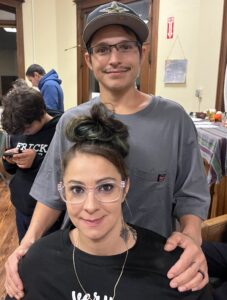 As we seek to share the liberating message of Jesus through personal visits, ministry on the street, Bible studies and teaching we’ve come to recognize over and over that it’s not about transmitting knowledge so people can amass facts about God, Jesus, and the Bible. We all need the living Word to pierce our hearts, making it through our indifference, negative expectations, and defenses. This is the work of the Holy Spirit, who reveals, reminds us, and others of Jesus’ teaching, pointing us in the right direction as we call, visit, approach people, and write articles and books.
As we seek to share the liberating message of Jesus through personal visits, ministry on the street, Bible studies and teaching we’ve come to recognize over and over that it’s not about transmitting knowledge so people can amass facts about God, Jesus, and the Bible. We all need the living Word to pierce our hearts, making it through our indifference, negative expectations, and defenses. This is the work of the Holy Spirit, who reveals, reminds us, and others of Jesus’ teaching, pointing us in the right direction as we call, visit, approach people, and write articles and books.
Jesus recognized that his own example and teaching were not enough for his disciples to bear witness, continuing his movement after his death, resurrection, and ascension.
“I am sending forth the promise of my Father upon you; but you are to stay in the city until you are clothed with power from on high” (Lk 24:49).
Once they’d received the empowerment of the Spirit at Pentecost, they stepped into their spiritual authority and were led by the Spirit to exercise gifts of the Spirit like healing the sick, receiving inspired revelation, prophesying, discerning, and casting out evil spirits…
The last verse of Mark’s Gospel states clearly what we need and expect. “And they went out and preached everywhere, while the Lord worked with them, and confirmed the word by the signs that followed” (Mk 16:20).
We pray regularly for physical healing at our Tierra Nueva Bible studies, street outreach and Sunday worship, and often hear that it happens.
Last week Mike, a strong, 61-year-old truck driving instructor told us how he’d been living with pain in his right shoulder that was worsening, making it hard to shift gears as he drove trucks and trained drivers. He shared how he’s always been wired outwards, thinking of how he can help people, and has struggled to receive for himself. Since he’d lost his health insurance after being unemployed and didn’t yet qualify for the health plan in his new job, he decided a few weeks back to do something he’d never done—to ask Jesus to heal him! After asking for healing for his right shoulder he said he slept like a baby, awaking to complete freedom from pain, which is gone for good.
While teaching Iranian underground church leaders in Armenia in mid-October, many received healing and were filled with the Holy Spirit in ways that brought refreshment and empowerment for ministry.
We often experience being guided by the Spirit as we seek out people on the streets. Last Friday night we were having trouble locating anyone as the police had been driving people away from the usual places where people gather. When we finally began finding people and served them hot drinks, I was offering to pray for people if they had any particular needs. Nearly everyone was responding: “No thanks. I’m good.”
After hearing these responses and knowing people were in dire need, I suddenly received what I think was an inspired word, which I shared with a group of younger men and women who were inhaling fentanyl smoke from foil they were heating up before me beside the dumpsters of a big box store.
“Actually, you don’t need me to pray for you. You can pray to God directly yourselves,” I said, “There are no barriers between you and God. God loves you just the way you are and wants to help you. There are no hoops you have to jump through, nothing you have to do to qualify. Jesus showed us this when he walked the earth, by freely caring for and openly loving those society excluded, and he’s still alive to help us now.”
A young woman looked up startled from her smoking foil and said “that’s exactly what my mother says. She’s a Lutheran pastor.” Another woman looked up, tears welling up in her eyes. It seemed the Spirit enabled the Word to reach people’s heart. This inspires us to keep watching and expecting the Spirit’s guidance and direct action, which brings the Kingdom of God to the streets.
A woman who attends Tierra Nueva named Kristen (pictured above with her husband Eliazar) and her brother Gavin were miraculously spared from death when their car was hit by a speeding Amtrak train late one night (photos of car below). While she broke her back and Gavin was in critical care for over a month, both are recovering speedily as a result of prayer (listen to her testimony “Hit by a train but saved by Jesus” on my weekly podcast “Disciple: Word, Spirit, Justice, Witness” on Spotify or Apple).
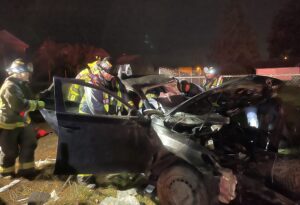
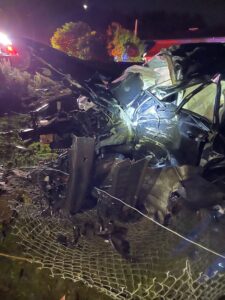


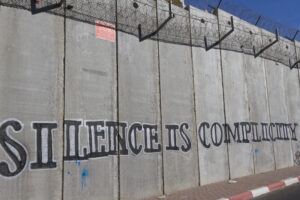
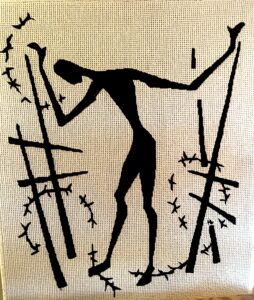
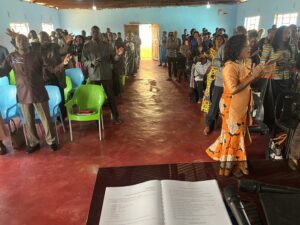
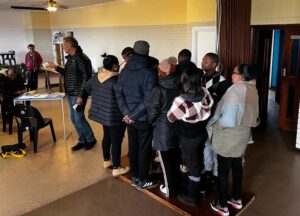
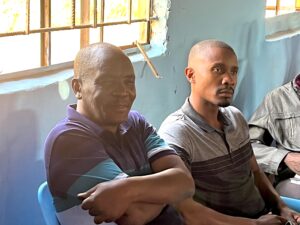

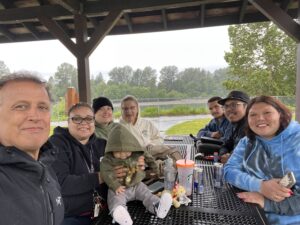
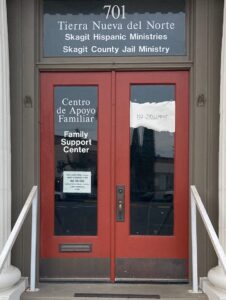
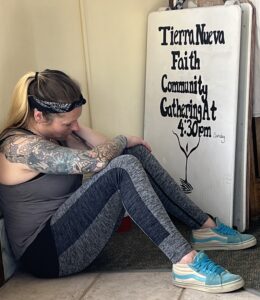
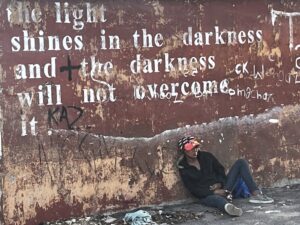
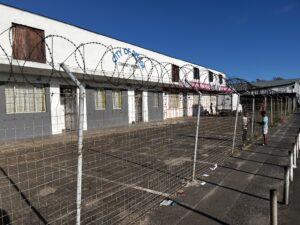
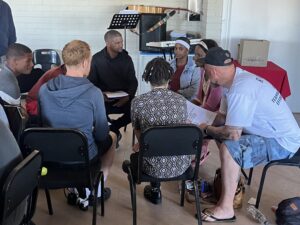

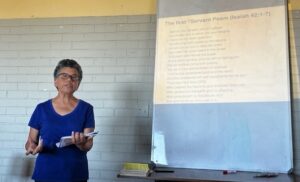
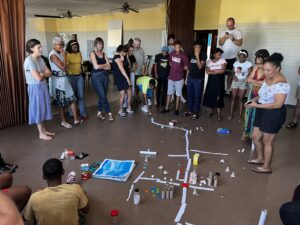
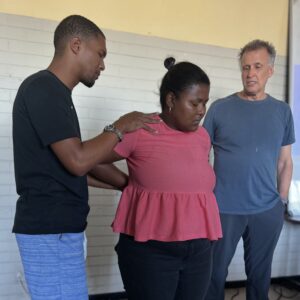
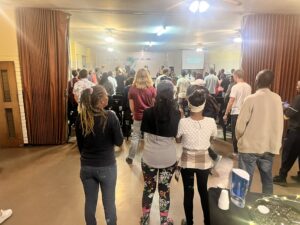 That night we gathered for Tree of Life’s monthly Kingdom Come worship service, where we lamented these deaths, interceded for the community and ended with a healing service. Many people came up for prayer, and the Spirit of God moved powerfully to bring relief. In places like Manenberg the urgency of proclaiming a liberating Gospel and seeing God’s Kingdom come is certainly apparent. May we continue to pray that God’s Kingdom will come, God’s will be done, on earth as in heaven, and open ourselves to being part of Jesus’ liberation movement.
That night we gathered for Tree of Life’s monthly Kingdom Come worship service, where we lamented these deaths, interceded for the community and ended with a healing service. Many people came up for prayer, and the Spirit of God moved powerfully to bring relief. In places like Manenberg the urgency of proclaiming a liberating Gospel and seeing God’s Kingdom come is certainly apparent. May we continue to pray that God’s Kingdom will come, God’s will be done, on earth as in heaven, and open ourselves to being part of Jesus’ liberation movement.